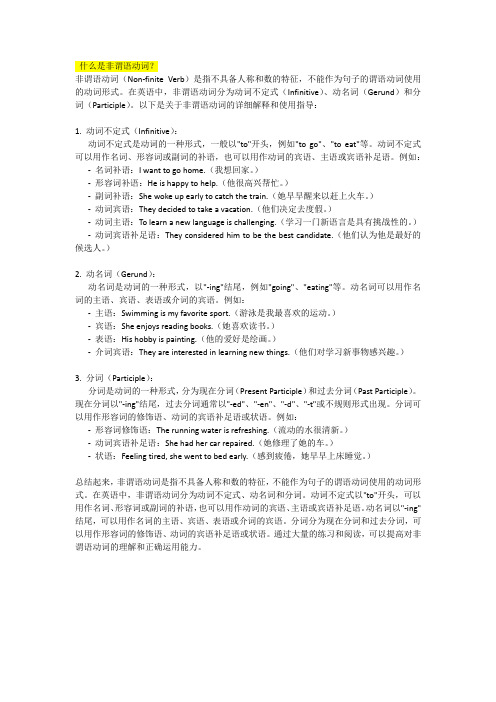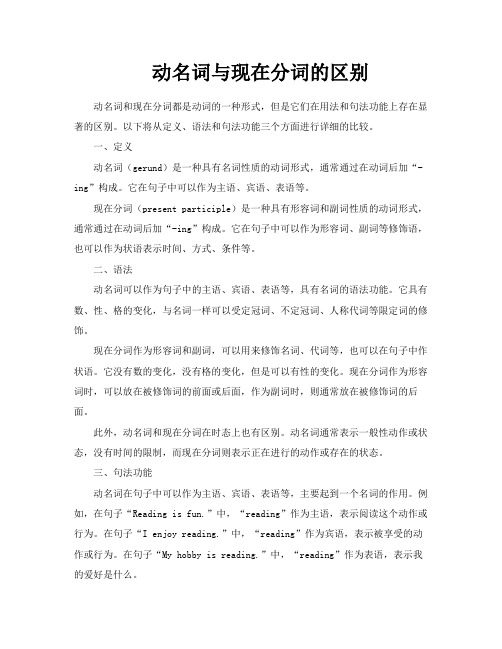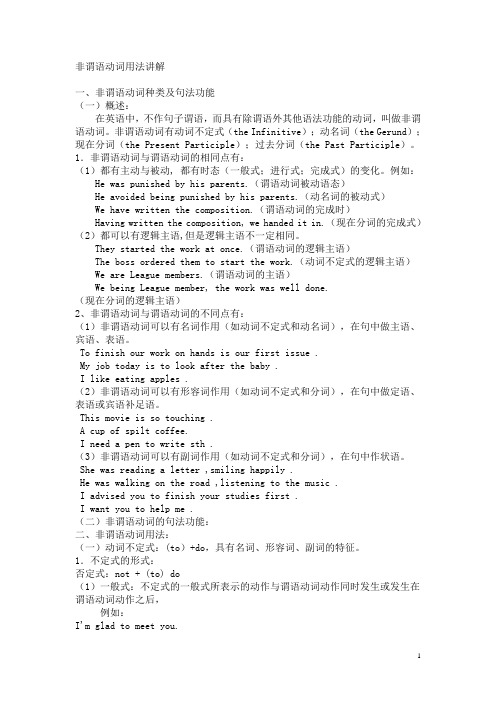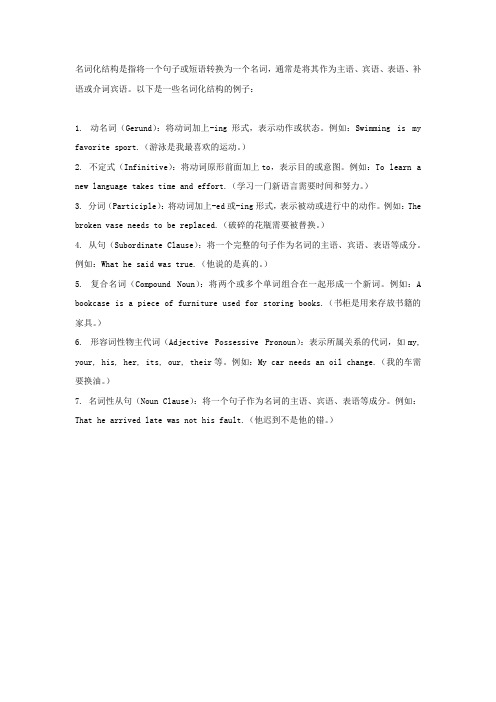动名词THE GERUND
动名词作定语的英语例句简单一点

动名词作定语的英语例句简单一点Using gerunds as adjectives is a common and effective way to modify a noun in English. Gerunds are formed by adding "-ing" to a verb and can be used to describe an action or activity that is related to the noun being modified. In this article, we will explore some simple examples of how gerunds can be used as adjectives in sentences.1. The running water sounded soothing and peaceful.In this sentence, the gerund "running" is used to describe the type of water, indicating that it is moving or flowing. The gerund acts as an adjective modifying the noun "water."2. She wore a sparkling dress to the party.Here, the gerund "sparkling" describes the quality of the dress, suggesting that it is shiny and reflective. The gerund functions as an adjective modifying the noun "dress."3. The barking dog woke up the entire neighborhood.In this example, the gerund "barking" is used to describe the type of dog, indicating that it is making loud, repetitive noises. The gerund functions as an adjective modifying the noun "dog."4. I bought a calming tea to help me relax.The gerund "calming" describes the effect or purpose of the tea, suggesting that it is intended to provide a sense of peace or tranquility. The gerund acts as an adjective modifying the noun "tea."5. The annoying alarm clock went off at 6 AM.Here, the gerund "annoying" describes the quality of the alarm clock, indicating that it is causing irritation or frustration. The gerund functions as an adjective modifying the noun "alarm clock."6. The chirping birds greeted us as we entered the park.In this sentence, the gerund "chirping" is used to describe the type of birds, suggesting that they are making high-pitched, repetitive sounds. The gerund acts as an adjective modifying the noun "birds."7. The leaking faucet dripped water onto the floor.Here, the gerund "leaking" describes the condition of the faucet, indicating that it is allowing water to escape. The gerund functions as an adjective modifying the noun "faucet."8. The shimmering stars lit up the night sky.In this example, the gerund "shimmering" describes the appearance of the stars, suggesting that they are shining brightly and sparkling. The gerund acts as an adjective modifying the noun "stars."9. The racing cars sped past us on the track.Here, the gerund "racing" is used to describe the type of cars, indicating that they are moving at high speeds. The gerund functions as an adjective modifying the noun "cars."10. The rustling leaves rustled in the wind.In this sentence, the gerund "rustling" is used to describe the sound of the leaves, suggesting that they are moving or swaying in the breeze. The gerund acts as an adjective modifying the noun "leaves."Overall, using gerunds as adjectives can add detail and vividness to a sentence by describing actions, qualities, or characteristics related to the noun being modified. By incorporating gerunds into your writing, you can create more dynamic and engaging descriptions that bring your sentences to life.。
动名词和现在分词总结

动名词和现在分词一. 动名词(the Gerund)和现在分词(the Present Participle)都是非谓语动词,在句中不能作谓语。
1.动名词与现在分词的否定要否定在其前面。
动名词:相当于名词。
现在分词:相当于形容词和副词。
3.发现划线部分所做的成分:1)Collecting stamps is interesting. 集邮很有趣。
当动名词短语做主语时常用it作形式主语。
It’s no use crying. 哭是没用的。
2)His hobby is collecting stamps. 他的爱好是集邮。
The present situation is inspiring. 当前的形势鼓舞人心。
He is singing. 他正在唱歌。
3)They haven’t finished building the dam. 他们还没有建好大坝。
We have to prevent the air from being polluted. 我们必须阻止空气被污染。
注:We found it no good making fun of others. 我们发现取笑他人不好。
4)He can’t walk without a walking-stick. 他没有拐杖不能走路。
In the following years he worked even harder.在后来的几年中,他学习更努力了。
The man speaking to the teacher is our monitor’s father.正与老师谈话的那个人是我们班长的父亲。
5)The cave, his hiding-place is secret. 那个山洞,他藏身的地方很秘密。
His habit, listening to the news on the radio remains unchanged.他收听收音机新闻节目的习惯仍未改变。
什么是非谓语动词

什么是非谓语动词?非谓语动词(Non-finite Verb)是指不具备人称和数的特征,不能作为句子的谓语动词使用的动词形式。
在英语中,非谓语动词分为动词不定式(Infinitive)、动名词(Gerund)和分词(Participle)。
以下是关于非谓语动词的详细解释和使用指导:1. 动词不定式(Infinitive):动词不定式是动词的一种形式,一般以"to"开头,例如"to go"、"to eat"等。
动词不定式可以用作名词、形容词或副词的补语,也可以用作动词的宾语、主语或宾语补足语。
例如:-名词补语:I want to go home.(我想回家。
)-形容词补语:He is happy to help.(他很高兴帮忙。
)-副词补语:She woke up early to catch the train.(她早早醒来以赶上火车。
)-动词宾语:They decided to take a vacation.(他们决定去度假。
)-动词主语:To learn a new language is challenging.(学习一门新语言是具有挑战性的。
)-动词宾语补足语:They considered him to be the best candidate.(他们认为他是最好的候选人。
)2. 动名词(Gerund):动名词是动词的一种形式,以"-ing"结尾,例如"going"、"eating"等。
动名词可以用作名词的主语、宾语、表语或介词的宾语。
例如:-主语:Swimming is my favorite sport.(游泳是我最喜欢的运动。
)-宾语:She enjoys reading books.(她喜欢读书。
)-表语:His hobby is painting.(他的爱好是绘画。
动名词与不定式区别

动名词与不定式区别动名词(gerund)和不定式(infinitive)是英语中两种常见的动词形式。
虽然它们在某些情况下具有相似的用法和意义,但在其他情况下,它们又有一些明显的区别。
本文将就动名词和不定式的用法、语法形式以及在句子中的作用进行详细讨论。
1. 动名词的用法和形式动名词是动词-ing形式的名词化,它可以作为主语、宾语、表语、介词宾语等在句子中起到名词的作用。
动名词常表示活动、行为、经历或想法等概念。
以下是一些动名词的用法:(1)作主语:Swimming is her favorite sport.(2)作宾语:I enjoy reading novels in my free time.(3)作表语:His hobby is playing the guitar.(4)作介词宾语:She is good at dancing.动名词的语法形式为动词的-ing形式,可以通过在动词后直接加-ing构成。
动名词可以与助动词、情态动词以及一些动词短语连用构成复合结构。
例如:I am studying for the exam.He can't help laughing at the joke.2. 不定式的用法和形式不定式是英语中的一种动词形式,通常由动词原形前加上to构成。
不定式可以作为主语、宾语、定语、表语以及状语在句子中起到动词的作用。
以下是一些不定式的用法:(1)作主语:To travel around the world is my dream.(2)作宾语:I want to learn how to play the piano.(3)作定语:This is the best book to read.(4)作表语:Her ambition is to become a doctor.(5)作状语:He stayed up late to finish his homework.不定式的语法形式为动词原形前加上to,但在某些情况下to可以省略。
动名词与现在分词的区别

动名词与现在分词的区别动名词和现在分词都是动词的一种形式,但是它们在用法和句法功能上存在显著的区别。
以下将从定义、语法和句法功能三个方面进行详细的比较。
一、定义动名词(gerund)是一种具有名词性质的动词形式,通常通过在动词后加“-ing”构成。
它在句子中可以作为主语、宾语、表语等。
现在分词(present participle)是一种具有形容词和副词性质的动词形式,通常通过在动词后加“-ing”构成。
它在句子中可以作为形容词、副词等修饰语,也可以作为状语表示时间、方式、条件等。
二、语法动名词可以作为句子中的主语、宾语、表语等,具有名词的语法功能。
它具有数、性、格的变化,与名词一样可以受定冠词、不定冠词、人称代词等限定词的修饰。
现在分词作为形容词和副词,可以用来修饰名词、代词等,也可以在句子中作状语。
它没有数的变化,没有格的变化,但是可以有性的变化。
现在分词作为形容词时,可以放在被修饰词的前面或后面,作为副词时,则通常放在被修饰词的后面。
此外,动名词和现在分词在时态上也有区别。
动名词通常表示一般性动作或状态,没有时间的限制,而现在分词则表示正在进行的动作或存在的状态。
三、句法功能动名词在句子中可以作为主语、宾语、表语等,主要起到一个名词的作用。
例如,在句子“Reading is fun.”中,“reading”作为主语,表示阅读这个动作或行为。
在句子“I enjoy reading.”中,“reading”作为宾语,表示被享受的动作或行为。
在句子“My hobby is reading.”中,“reading”作为表语,表示我的爱好是什么。
现在分词在句子中主要作为形容词、副词等修饰语,起到一个修饰、描述或说明的作用。
例如,在句子“The dog is running after the ball.”中,“running”作为现在分词作形容词,描述了“dog”的状态。
在句子“While I was reading, she came in.”中,“reading”作为现在分词作状语,表示我正在进行的动作。
非谓语动词用法讲解

非谓语动词用法讲解一、非谓语动词种类及句法功能(一)概述:在英语中,不作句子谓语,而具有除谓语外其他语法功能的动词,叫做非谓语动词。
非谓语动词有动词不定式(the Infinitive);动名词(the Gerund);现在分词(the Present Participle);过去分词(the Past Participle)。
1.非谓语动词与谓语动词的相同点有:(1)都有主动与被动, 都有时态(一般式;进行式;完成式)的变化。
例如:He was punished by his parents.(谓语动词被动语态)He avoided being punished by his parents.(动名词的被动式)We have written the composition.(谓语动词的完成时)Having written the composition, we handed it in.(现在分词的完成式)(2)都可以有逻辑主语,但是逻辑主语不一定相同。
They started the work at once.(谓语动词的逻辑主语)The boss ordered them to start the work.(动词不定式的逻辑主语)We are League members.(谓语动词的主语)We being League member, the work was well done.(现在分词的逻辑主语)2、非谓语动词与谓语动词的不同点有:(1)非谓语动词可以有名词作用(如动词不定式和动名词),在句中做主语、宾语、表语。
To finish our work on hands is our first issue .My job today is to look after the baby .I like eating apples .(2)非谓语动词可以有形容词作用(如动词不定式和分词),在句中做定语、表语或宾语补足语。
动名词(gerund)和现在分词(present-participle)的区别

动名词(gerund)和现在分词(present participle)的区别所谓动名词(gerund)就是名词,只是保有一些动词的功能。
所以它在句中可以作主语,宾语,表语,同位语,定语等那些名词可以充当的成分.而现在分词(present participle)相当于形容词,在句中作定语或者状语所以当—ing形式出现在句中作主语,宾语,同位语时,它肯定时gerund.当-ing形式出现在句中作状语时,它肯定是present participle.它们有可能被弄错的是作表语和定语时.其实也很好区分1. 作表语: 我们知道, 名词和形容词都可以作表语。
This is water(n。
).It is transparent(adj).这时你肯定能明白,如果—ing作表语相当于n.它就是gerund. 反之相当于adj.时它就是present。
participle。
The situation both at home and abroad is very inspiring。
One of the best exercises is swimming.2. 作定语时的区别我在回答中已经解释了. 动名词作定语时,表示它所修饰的名词的性能和用途,和它所修饰的名词在逻辑上没有主谓关系;现在分词作定语时,表示它所修饰的名词正在进行的动作,和它所修饰的名词在逻辑上有主谓关系。
a sleeping bag。
(用途)=a bag for sleepinga sleeping child = a child is sleeping (child是sleep的主语,sleep是child 发出的动作)(呵呵下面再请你告诉我它们分别是什么吧!a swimming girla swimming pool3. 最后来解释修饰他们到底该用是adv, 还是adj.无论是Present participle。
还是gerund, 它们都叫做动词的-ing形式(所以若有人分不清它们时,多把它们混为一谈).也就是说它们都有动词的特点,故而都可用adv修饰。
名词化结构举例

名词化结构是指将一个句子或短语转换为一个名词,通常是将其作为主语、宾语、表语、补语或介词宾语。
以下是一些名词化结构的例子:1. 动名词(Gerund):将动词加上-ing形式,表示动作或状态。
例如:Swimming is my favorite sport.(游泳是我最喜欢的运动。
)2. 不定式(Infinitive):将动词原形前面加上to,表示目的或意图。
例如:To learn a new language takes time and effort.(学习一门新语言需要时间和努力。
)3. 分词(Participle):将动词加上-ed或-ing形式,表示被动或进行中的动作。
例如:The broken vase needs to be replaced.(破碎的花瓶需要被替换。
)4. 从句(Subordinate Clause):将一个完整的句子作为名词的主语、宾语、表语等成分。
例如:What he said was true.(他说的是真的。
)5. 复合名词(Compound Noun):将两个或多个单词组合在一起形成一个新词。
例如:A bookcase is a piece of furniture used for storing books.(书柜是用来存放书籍的家具。
)6. 形容词性物主代词(Adjective Possessive Pronoun):表示所属关系的代词,如my, your, his, her, its, our, their等。
例如:My car needs an oil change.(我的车需要换油。
)7. 名词性从句(Noun Clause):将一个句子作为名词的主语、宾语、表语等成分。
例如:That he arrived late was not his fault.(他迟到不是他的错。
)。
- 1、下载文档前请自行甄别文档内容的完整性,平台不提供额外的编辑、内容补充、找答案等附加服务。
- 2、"仅部分预览"的文档,不可在线预览部分如存在完整性等问题,可反馈申请退款(可完整预览的文档不适用该条件!)。
- 3、如文档侵犯您的权益,请联系客服反馈,我们会尽快为您处理(人工客服工作时间:9:00-18:30)。
THE GERUNDThis looks exactly the same as a present participle, and for this reason it is now common to call both forms 'the -ing form'. However it is useful to understand the difference between the two. The gerund always has the same function as a noun (although it looks like a verb), so it can be used:a.as the subject of the sentence:∙Eating people is wrong.∙Hunting tigers is dangerous.∙Flying makes me nervous.b.as the complement of the verb 'to be':∙One of his duties is attending meetings.∙The hardest thing about learning English is understanding the gerund.∙One of life's pleasures is having breakfast in bed.c. after prepositions.The gerund must be used when a verb comes after a preposition:∙Can you sneeze without opening your mouth?∙She is good at painting.∙They're keen on windsurfing.∙She avoided him by walking on the opposite side of the road.∙We arrived in Madrid after driving all night.∙My father decided against postponing his trip to Hungary.This is also true of certain expressions ending in a preposition, e.g. in spite of, there's no point in..:∙There's no point in waiting.∙In spite of missing the train, we arrived on time.d. after a number of 'phrasal verbs' which are composed of a verb +preposition/adverbExample:to look forward to, to give up, to be for/against, to take to, to put off, to keep on:∙I look forward to hearing from you soon. (at the end of a letter)∙When are you going to give up smoking?∙She always puts off going to the dentist.∙He kept on asking for money.NOTE: There are some phrasal verbs and other expressions that include the word 'to' as a preposition, not as part of a to-infinitive: - to look forward to, to take to, to be accustomed to, to be used to. It is important to recognise that 'to' is a preposition in these cases, as it must be followed by a gerund:∙We are looking forward to seeing you.∙I am used to waiting for buses.∙She didn't really take to studying English.It is possible to check whether 'to� is a preposition or part of a to-infinitive: if you can put a noun or the pronoun 'it' after it, then it is a preposition and must be followed by a gerund:∙I am accustomed to it (the cold).∙I am accustomed to being cold.e. in compound nounsExample:∙ a driving lesson, a swimming pool, bird-watching, train-spottingIt is clear that the meaning is that of a noun, not of a continuous verb.Example:∙the pool is not swimming, it is a pool for swimming in.f. after the expressions:can't help, can't stand, it's no use/good, and the adjective worth:∙She couldn't help falling in love with him.∙I can't stand being stuck in traffic jams.∙It's no use/good trying to escape.∙It might be worth phoning the station to check the time of the train.VERBS FOLLOWED BY THE GERUNDThe gerund is used after certain verbs.Examplemiss: I miss living in England.The most important of these verbs are shown below. Those marked * can also be followed by a that-clauseExample:VERB GERUNDShe admitted... breaking the windowTHAT-CLAUSEShe admitted... that she had broken the window.acknowledge,*admit,*anticipate,* appreciate,* avoid,celebrate,consider, contemplate, defer,delay,deny,*detest,dislike,dread,enjoy,entail,escape,excuse,fancy (=imagine)*, finish,forgive,imagine,*involve, keep,loathe,mean,(=have as result)* mention,*mind,miss,pardon,postpone,prevent,propose,*recall,*recollect,*remember,report,*resent,resist,risk,save (=prevent the wasted effort) stop,suggest,*understand,*Notes:Appreciate is followed by a possessive adjective and the gerund when the gerund does not refer to the subject.Compare :∙I appreciate having some time off work. (I'm having the time...)∙I appreciate your giving me some time off work. (You're giving me the time...)Excuse, forgive, pardon can be followed by an object and the gerund or for + object and the gerund (both common in spoken English), or a possessive adjective + gerund (more formal and less likely to be said):∙Excuse me interrupting.∙Excuse me for interrupting.∙Excuse my interrupting.Suggest can be used in a number of ways, but BE CAREFUL.It is important not to confuse these patterns:suggest/suggested (+ possessive adjective) + gerund:∙He suggests going to Glastonbury∙He suggested going to Glastonbury∙He suggested/suggests my going to Glastonburysuggest/suggested + that-clause (where both that and should may be omitted):∙He suggests that I should go to New York∙He suggested that I should go to New York∙He suggested/suggests I should go to New York∙He suggested/suggests I go to New York∙He suggested I went to New York.suggest/suggested + question word + infinitive:∙He suggested where to go.Propose is followed by the gerund when it means 'suggest':∙John proposed going to the debate∙but by the infinitive when it means 'intend':The Government proposes bringing in new laws..Stop can be followed by a gerund or infinitive, but there is a change of meaning -see GERUND / INFINITIVE?section.Dread is followed by the infinitive when used with 'think', in the expression 'I dread to think':∙I dread to think what she'll do next.Prevent is followedEITHER by a possessive adjective + gerund:∙You can't prevent my leaving.OR by an object + from + gerund:∙You can't prevent me from leaving.Examples∙Normally, a girl wouldn't think of marrying a man she did not love.∙Most people don't like receiving bad news.∙We can't risk getting wet - we haven't got any dry clothes.∙If you take that job it will mean getting home late every night.∙I can't imagine living in that big house.∙If you buy some petrol now, it will save you stopping on the way to London.∙She couldn't resist eating the plum she found in the fridge.∙They decided to postpone painting the house until the weather improved.Verbs Followed by Gerunds9 = verb followed by a gerund OR a noun + an infinitive13 = verb followed by a gerund OR an infinitive with a difference in meaning14 = verb followed by a gerund OR an infinitive with little difference in meaningInitiation, Completion and Incompletionanticipate avoid begin cease complete delayfinishget throughgive uppostponequitriskstartstoptryCommunicationadmit advise deny discuss encouragemention recommendreportsuggesturgeContinuing Actioncontinue can't help practiceinvolvekeepkeep onEmotionappreciate dislike enjoy hatelike loveminddon't mindmisspreferregretcan't standresentresisttolerateMental Processanticipate consider forget imaginerecallrememberseecan't seeunderstandThe verbs in the following table can be followed by either an infinitive or a gerund, and there will be virtually no difference in the meaning of the two sentences. I like to playbasketball in the park. I like playing basketball in the park.attempt begin continue hate likeloveneglectpreferregretcan't standstandstartThe verbs in this next, very small table can be followed by either an infinitive or a gerund, but there will be a difference in meaning. I stopped smoking meanssomething quite different, for instance, from I stopped to smoke. The infinitive form will usually describe a potential action.forget rememberstopVerbs Involving Sensesfeel hear listen to look atnoticeobserveoverhearseewatchVerbs of perception —hear, see, watch— and a handful of other verbs —help, let, and make— will take what is called the bare infinitive, an infinitive without the particle "to." This is true of these verbs only in the active voice.Using Possessives with GerundsDo we say "I can't stand him singing in the shower," or do we say "I can't stand his singing in the shower"? Well, you have to decide what you find objectionable: is it him, the fact that he is singing in the shower, or is it the singing that is being done by him that you can't stand? Chances are, it's the latter, it's the singing that belongs to him that bugs you. So we would say, "I can't stand his singing in the shower."On the other hand, do we say "I noticed your standing in the alley last night"? Probably not, because it's not the action that we noticed; it's the person. So we'd say and write, instead, "I noticed you standing in the alley last night." Usually, however, when a noun or pronoun precedes a gerund, that noun or pronoun takes a possessive form. This is especially true of formal, academic writing.There are exceptions to this. (What would the study of language be without exceptions?)When the noun preceding the gerund is modified by other words, use the common form of that noun, not the possessive.a.Federico was pleased by Carlos's making the Dean's List for the firsttime.butb.Federico was pleased by Carlos, his oldest son, making the Dean'sList for the first time.When the noun preceding the gerund is plural, collective, or abstract, usethe common form of that noun, not the possessive.There are certain situations in which the possessive and the gerund createan awkward combination. This seems to be particularly true whenindefinite pronouns are involved.f.I was shocked by somebody's making that remark.This would be greatly improved by saying, instead . . .g.I was shocked that somebody would make that remark.This is also true when the "owner" of the gerund comes wrapped in anoun phrase:o I was thankful for the guy next door shoveling snow from mydriveway.The Gerund and the Present Participle: 'ING' FormINTRODUCTIONThe '-ing' form of the verb may be a present participle or a gerund.The form is identical, the difference is in the function, or the job the word does in the sentence.The present participle:This is most commonly used:∙as part of the continuous form of a verb,he is painting; she has been waiting∙after verbs of movement/position in the pattern:verb + present participle,She sat looking at the sea∙after verbs of perception in the pattern:verb + object + present participle,We saw him swimming∙as an adjective, e.g. amazing, worrying, exciting, boringThe gerund:This always has the same function as a noun (although it looks like a verb), so it can be used:∙as the subject of the sentence:Eating people is wrong.∙after prepositions:Can you sneeze without opening your mouth?She is good at painting∙after certain verbs,e.g. like, hate, admit, imagine∙in compound nouns,e.g. a driving lesson, a swimming pool, bird-watching, train-spottingThe Present ParticipleThe present participle of most verbs has the form base+ing and is used in the following ways:a. as part of the continuous form of a verb(See continuous tenses in VERB TENSES)Example:∙I am working∙he was singing∙they have been walkingb. after verbs of movement/position in the pattern: verb + present participle Example∙She went shopping∙He lay looking up at the clouds∙She came running towards meThis construction is particularly useful with the verb 'to go', as in these common expressions :to go shopping to go ski-ing to go fishing to go surfing to go walkingto go swimming to go running to go dancingc. after verbs of perception in the pattern:verb + object + present participleExample∙I heard someone singing.∙He saw his friend walking along the road.∙I can smell something burning!NOTE: There is a difference in meaning when such a sentence containsa zero-infinitive rather than a participle. The infinitive refers to a complete action, but the participle refers to an incomplete action, or part of an action.Compare:∙I heard Joanna singing(= she had started before I heard her, and probably went on afterwards)∙I heard Joanna sing(= I heard her complete performance)d. as an adjectiveExamplesamazing, worrying, exciting, boring.∙It was an amazing film.∙It's a bit worrying when the police stop you∙Dark billowing clouds often precede a storm.∙Racing cars can go as fast as 400kph.∙He was trapped inside the burning house.∙Many of his paintings depict the setting sun.e. with the verbs spend and waste, in the pattern:verb + time/money expression + present participleExample∙My boss spends two hours a day travelling to work.∙Don't waste time playing computer games!∙They've spent the whole day shopping.f. with the verbs catch and find, in the pattern:verb + object + present participle:With catch, the participle always refers to an action which causes annoyance or anger:∙If I catch you stealing my apples again, there'll be trouble!∙Don't let him catch you reading his letters.This is not the case with find, which is unemotional:∙We found some money lying on the ground.∙They found their mother sitting in the garden.g. to replace a sentence or part of a sentence:When two actions occur at the same time, and are done by the same person or thing, we can use a present participle to describe one of them:∙They went out into the snow. They laughed as they went. They went laughing out into the snow.∙He whistled to himself. He walked down the road. Whistling to himself, he walked down the road.When one action follows very quickly after another done by the same person or thing, we can express the first action with a present participle:∙He put on his coat and left the house. Putting on his coat, he left the house.∙She dropped the gun and put her hands in the air. Dropping the gun, she put her hands in the air.The present participle can be used instead of a phrase starting as, since, because, and it explains the cause or reason for an action:∙Feeling hungry, he went into the kitchen and opened the fridge.(= because he felt hungry...)∙Being poor, he didn't spend much on clothes.∙Knowing that his mother was coming, he cleaned the flat.GERUND OR INFINITIVE?GERUND OR INFINITIVE?GERUND OR INFINITIVE?The two groups of verbs below can be followed either by the gerund or by the infinitive. Usually this has no effect on the meaning, but with some verbs there is a clear difference in meaning. Verbs marked * can also be followed by a that-clause.Example: to preferI prefer to live in an apartment.I prefer living in an apartment.A. Verbs where there is little or no difference in meaning:allow attempt begin bother cease continue deservefear*hate*intend*likeloveneglectomitpermitprefer*recommend*startNotes:1. Allow is used in these two patterns:a. Allow + object + to-infinitive:∙Her parents allowed her to go to the party.b. Allow + gerund:∙Her parents don't allow smoking in the house.2. Deserve + gerund is not very common, but is mainly used with passive constructions or where there is a passive meaning:∙Your proposals deserve being considered in detail.∙These ideas deserve discussing. (= to be discussed).3. The verbs hate, love, like, prefer are usually followed by a gerund when the meaning is general,and by a to-infinitive when they refer to a particular time or situation. You must always use the to-infinitive with the expressions 'would love to', 'would hate to', etc.Compare:∙I hate to tell you, but Uncle Jim is coming this weekend.∙I hate looking after elderly relatives!∙I love dancing.∙I would love to dance with you.Part B: GERUND OR INFINITIVE?B. Verbs where there is a clear difference in meaning:Verbs marked with an asterisk* can also be followed by a that-clause.come forget* go on mean*regret*remember*stoptryCome:Come + gerund is like other verbs of movement followed by the gerund, and means that the subject is doing something as they move:∙She came running across the field.Come + to-infinitive means that something happens or develops, perhaps outside the subject's control:∙At first I thought he was crazy, but I've come to appreciate his sense of humour.∙How did you come to be outside the wrong house?∙This word has come to mean something quite different.Forget, regret and remember:When these verbs are followed by a gerund, the gerund refers to an action that happened earlier:∙I remember locking the door (= I remember now, I locked the door earlier)∙He regretted speaking so rudely. (= he regretted at some time in the past, he had spoken rudely at some earlier time in the past.)Forget is frequently used with 'never' in the simple future form:∙I'll never forget meeting my boss for the first time.When these verbs are followed by a to-infinitive, the infinitive refers to an actionhappening at the same time, or later:∙I remembered to lock the door (= I thought about it, then I did it.)∙Don't forget to buy some eggs! (= Please think about it and then do it.)∙We regret to announce the late arrival of the 12.45 from Paddington. (= We feel sorry before we tell you this bad news.)Go on:Go on + gerund means to continue with an action:∙He went on speaking for two hours.∙I can't go on working like this - I'm exhausted.Go on + to-infinitive means to do the next action, which is often the next stage in a process:∙After introducing her proposal, she went on to explain the benefits for the company.∙John Smith worked in local government for five years, then went on to become a Member of Parliament.Mean:Mean + gerund expresses what the result of an action will be, or what will be necessary:∙If you take that job in London it will mean travelling for two hours every day.∙We could take the ferry to France, but that will mean spending a night in a hotel. Mean + to-infinitive expresses an intention or a plan:∙Did you mean to dial this number?∙I mean to finish this job by the end of the week!∙Sorry - I didn't mean to hurt you.Stop:Stop + gerund means to finish an action in progress:∙I stopped working for them because the wages were so low.Stop tickling me!Stop + to-infinitive means to interrupt an activity in order to do something else, so the infinitive is used to express a purpose:∙I stopped to have lunch. (= I was working, or travelling, and I interrupted what I was doing in order to eat.)∙It's difficult to concentrate on what you are doing if you have to stop to answer the phone every five minutes.Try:Try + gerund means to experiment with an action that might be a solution to your problem.∙If you have problems sleeping, you could try doing some yoga before you go to bed, or you could try drinking some warm milk.∙'I can't get in touch with Carl.' 'Have you tried e-mailing him?'Try + to-infinitive means to make an effort to do something. It may be something very difficult or even impossible:∙The surgeons tried to save his life but he died on the operating table.∙We'll try to phone at 6 o'clock, but it might be hard to find a public telephone.∙People have to try to live together in harmony.。
